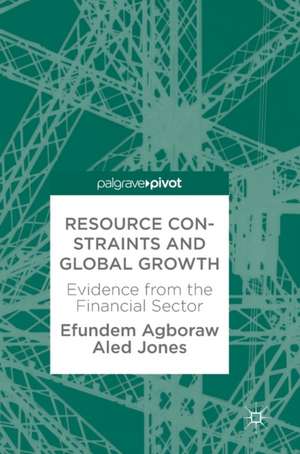Resource Constraints and Global Growth: Evidence from the Financial Sector
Autor Efundem Agboraw, Aled Jonesen Limba Engleză Hardback – 19 oct 2017
Preț: 387.20 lei
Nou
Puncte Express: 581
Preț estimativ în valută:
74.09€ • 79.23$ • 61.78£
74.09€ • 79.23$ • 61.78£
Carte tipărită la comandă
Livrare economică 17 aprilie-01 mai
Preluare comenzi: 021 569.72.76
Specificații
ISBN-13: 9783319677521
ISBN-10: 3319677527
Pagini: 135
Ilustrații: XI, 135 p. 7 illus. in color.
Dimensiuni: 148 x 210 mm
Greutate: 0.4 kg
Ediția:1st ed. 2017
Editura: Springer International Publishing
Colecția Palgrave Pivot
Locul publicării:Cham, Switzerland
ISBN-10: 3319677527
Pagini: 135
Ilustrații: XI, 135 p. 7 illus. in color.
Dimensiuni: 148 x 210 mm
Greutate: 0.4 kg
Ediția:1st ed. 2017
Editura: Springer International Publishing
Colecția Palgrave Pivot
Locul publicării:Cham, Switzerland
Cuprins
Chapter 1. Introduction.- Chapter 2. Economics and Natural Resource Constraints.- Chapter 3. Finance and Natural Resource Constraints.- Chapter 4. Exploring the validity of literature.- Chapter 5. Conclusions.
Notă biografică
Efundem Agboraw is Post-Doctoral Research Associate at Liverpool School of Tropical Medicine, UK. Her research focuses on the impact of natural resource scarcity on global economic growth.
Aled Jones is Director of the Global Sustainability Institute at Anglia Ruskin University, UK. He is one of the acknowledged global leaders in public–private finance related to the green economy.
Aled Jones is Director of the Global Sustainability Institute at Anglia Ruskin University, UK. He is one of the acknowledged global leaders in public–private finance related to the green economy.
Textul de pe ultima copertă
With substantial risks arising from resource constraints on global growth, serious questions are being posed about how a scarcity of finite resources may impact global social and political fragility. The research which forms the core of this book focuses on how this scarcity will impact the financial sector, especially through insurance, pension and banking activities. The UK finance sector, which is considered to be amongst the most globalised, is placed under the microscope, and its approaches to food and oil are particularly noteworthy. Interviews with senior financial experts are analysed alongside more traditional quantitative economic analysis to explore potential future impacts, the scope of natural resource constraints and their impact on the economy.
Caracteristici
Explores the consequences of climate change on economic growth through evidence from the UK financial sector Explains the role of natural resources in economic growth Empirically investigates the social, political and economic effects of natural resource constraints Includes supplementary material: sn.pub/extras
